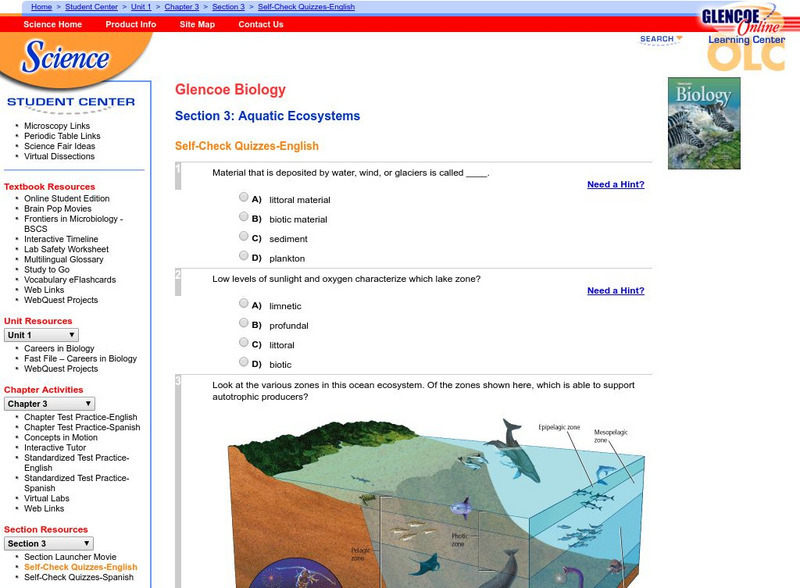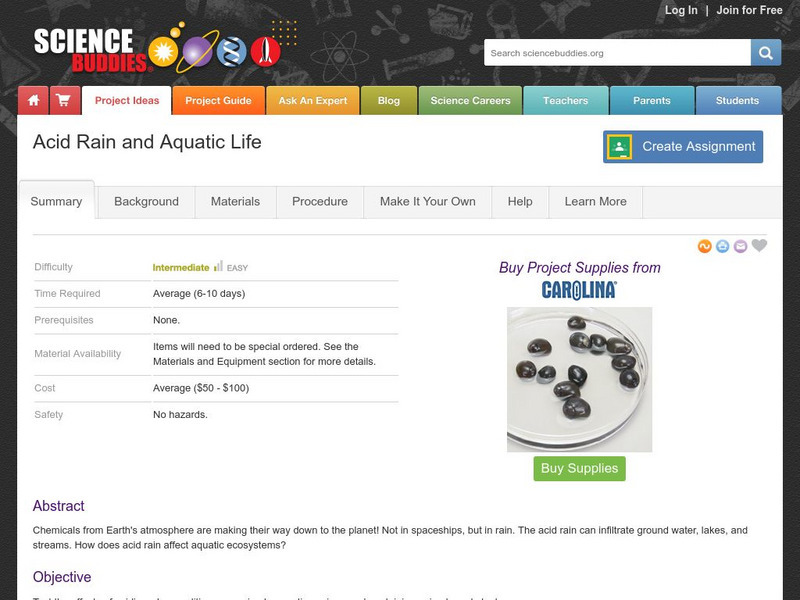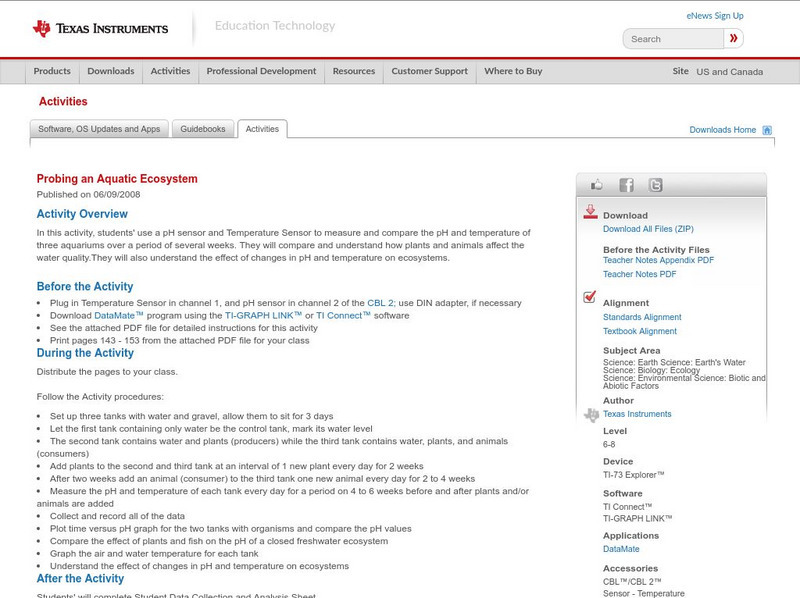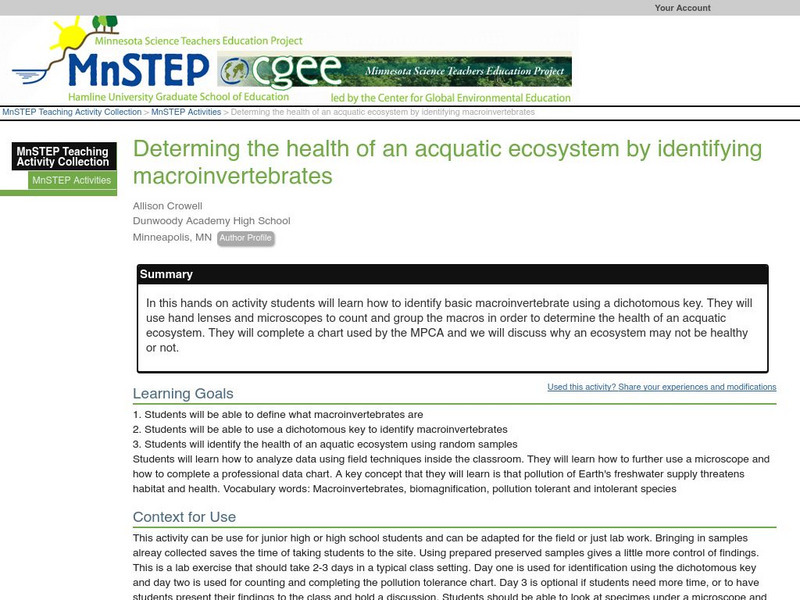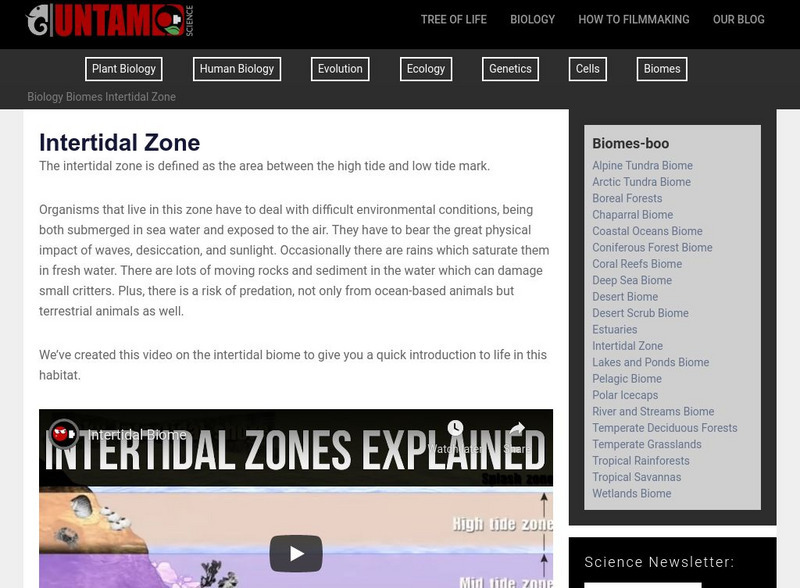Curated OER
Estuaries, Estuarine Habitats, and Adaptations
Middle schoolers conduct research on estuaries. They design and construct an estuary, describe the physical characteristics of an estuary, and create a diagram illustrating an estuarine food web.
Curated OER
Testing Water Quality
In this science worksheet, students test the quality of water taken from a local source and test it in a lab for the ingredients present.
Curated OER
Protists
In this protists worksheet, high schoolers will read about the different kinds of protists including protozoans, algae, and molds. Students will then complete 2 short answer questions and 1 true or false question.
Curated OER
Exploring the Beach
Students explore the beach. In this marine habitat instructional activity, students inspect sand grains, design beach profiles, classify marine life, and examine natural beach habitats. Students use spreadsheets to record data from their...
Curated OER
Mold
Students explore mold, the different types and the health risks that they pose. In this mycelium lesson students grow different molds and see which type of foods mold the fastest.
Curated OER
Relating Number of Insect Species to Water Quality
Students are asked to respond to questions such as:" Have there been surveys of the area to inventory the species?" (For example, for a wetland area, do they know what amphibians live there and how abundant they are?) Are there any...
Curated OER
Water Quality Survey: Monitoring the Sustainability of Pigeon Creek
High schoolers research the History of Pigeon Creek (or any watershed in your area). In this environmental science lesson, students conduct field tests such as pH and nitrates. They collect data and compare what they collected with other...
Curated OER
Urban Impact on Chollas Creek (California): A Field Study
Students, in groups, take samples from a creek and keep a field journal on their samples. They also perform tests on their samples.
Curated OER
Build a Bug
Learners design an ideally adapted macroinvertebrate to live in a water habitat. They illustrate their animal, name it and specify the adaptations it has that enable it to survive.
Curated OER
Mussel Movements
Students consider the impact of invasive species on local environments. In this ecology lesson, watch the video, Arizona Wildlife Views, which focuses on invasive species. Students develop vocabulary, relate to meaningful comprehension...
Curated OER
Amphipods
Students identify organisms that live at the bottom of the body of water. In this biology lesson, students evaluate the effects of pollution to amphipods population. They examine collected data and create a bar graph comparing them.
Scholastic
Scholastic: Study Jams! Science: Ecosystems: Aquatic Ecosystems
A video and a short multiple-choice quiz on the topic of aquatic ecosystems. It discusses the difference between freshwater and saltwater ecosystems, then explains what the three ecozones are in a marine ecosystem.
Science Education Resource Center at Carleton College
Serc: Investigating Aquatic Ecosystems: Macroinvertebrates and Water Quality
Young scholars will investigate three aquatic ecosystems (pond, stream, bog) to determine the relative pollution index and the water quality of each ecosystem. They will collect and analyze the benthic organisms found in each system and...
McGraw Hill
Glencoe Biology: Aquatic Ecosystems: Self Check Quiz
Try these five multiple-choice questions about aquatic ecosystems. After answers are submitted, students can review their mistakes.
Science Buddies
Science Buddies: Acid Rain and Aquatic Life
Chemicals from the Earth's atmosphere are making their way down to the planet. Not in spaceships, but in rain. The acid rain can infiltrate ground water, lakes, and streams. How does acid rain affect aquatic ecosystems?
Texas Instruments
Texas Instruments: Probing an Aquatic Ecosystem
In this activity, students' use a pH sensor and Temperature Sensor to measure and compare the pH and temperature of three aquariums over a period of several weeks. They will compare and understand how plants and animals affect the water...
Science Education Resource Center at Carleton College
Serc: Identifying Macroinvertebrates to Determine Health of Aquatic Ecosystem
In this hands on activity students will learn how to identify basic macroinvertebrate using a dichotomous key. They will complete a chart used by the MPCA and we will discuss why an ecosystem may not be healthy or not.
CK-12 Foundation
Ck 12: Life Science: 12.14 Aquatic Biomes
Understand the living and nonliving aspects of aquatic ecosystems.
Science Education Resource Center at Carleton College
Serc: Mn Step: Stream Study: An Investigation of an Aquatic Ecosystem
For this activity, students visit a local stream over a 9-week period to take measurements of its chemical and physical attributes, and collect information about the life forms it supports. After exploration, they will choose what they...
CK-12 Foundation
Ck 12: Life Science: Aquatic Biomes
[Free Registration/Login may be required to access all resource tools.] Aquatic biomes can be generally classified based on the amount of salt in the water. Freshwater biomes have less than 1% salt and are typical of ponds and lakes,...
Untamed Science
Untamed Science: Biology: World Biomes: Intertidal Zone: Aquatic Biome
Learn about the flora and fauna of the intertidal aquatic zone and the characteristics that describe this aquatic biome through reading and watching video clips. [6:42]
University of Florida
Florida Museum: South Florida Aquatic Environments: Introduced Species
The transport of living plants and animals to areas beyond their native range has been practiced by human beings for thousands of years. While some introductions are intentional, others occur by accident or happenstance. Regardless of...
















